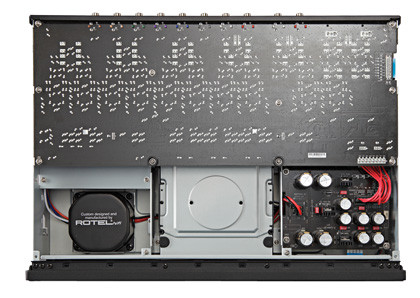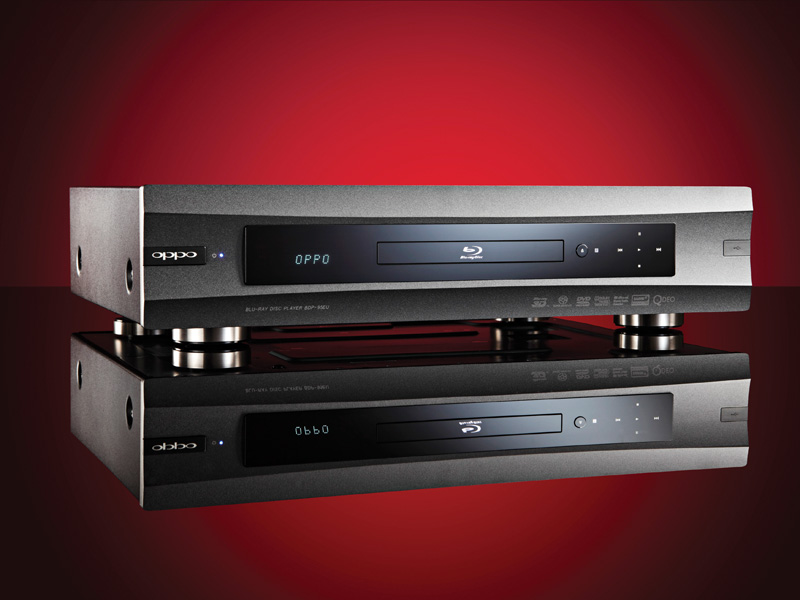TechRadar Verdict
Pros
- +
Revealing, transparent and musically involving
- +
Good design
- +
Connectivity
Cons
- -
Has some annoying bugs
- -
Not compatible with MP3
Why you can trust TechRadar
Universal disc players have always been a distraction from CD-only machines. They offer incredible value and with CD now in decline, the case for buying is growing.
Oppo has launched a rather special unit with audiophiles firmly in mind. Its new BDP-95EU plays the usual SACD, DVD-A and legacy CDs, but it also offers cutting-edge 3D Blu-ray playback and will play content held on external drives or network storage.
It's connectivity compliment is something else. As an added bonus, HDCD-encoded CDs can also be enjoyed in all their 20-bit glory, as Oppo has paid a considerable amount of detail to optimising the sound quality of analogue audio.
The 7.1 outputs take advantage of an ESS 9018S multichannel Sabre32 Reference DAC; a separate DAC drives the dedicated stereo outputs. Unusually, these are available in both phono (unbalanced) and XLR (balanced) form.
The jury's still out on the benefits of XLR, however, as far as home audio is concerned. Balanced is fine for studio applications, where interconnects may run to tens of metres. But for a metre (or less) between player and amplifier?
Fortunately, the BDP-95EU's XLRs have some domestic potential, especially if you have a separate AV system and hi-fi rig located some distance apart. So if you want to locate the unit with your AV gear, then that's fine because the player's stereo output can be routed to a suitable amp via XLRs of appropriate length.

The right connections
Sign up for breaking news, reviews, opinion, top tech deals, and more.
In connectivity terms, the BDP-95EU truly excels. Its two HDMI ports are useful if you have an older (pre HDMI 1.4) AV receiver, but want to enjoy 3D TV. Just connect one port to your amplification and the other to your display.
A handful of mass-market players (notably Panasonic models) are similarly endowed and some of these also give you the Oppo's composite and component analogue video outputs.
And while it's true to say that the majority of Blu-ray players boast a USB port, or two, for playback of multimedia files stored on USB ports, it's very rare to see an eSATA port – to which can be connected an external hard drive (the BDP-95EU also understands FAT/FAT32 and NTFS disk formats). There's also an Ethernet port, for online content and networked multimedia – a Wi-Fi 'dongle' is also supplied.
Both RS232 and infra-red ports are provided, should you envisage controlling the player from a touch-pad. Both optical and coaxial versions of digital audio output will drive external DACs; for multi-channel hi-res audio, though, HDMI is essential.
On which subject, SACD's DSD streams can be passed to compatible AV receivers across this connector – LPCM conversion can be engaged via an on screen menu if yours is DSD-ignorant.
Our only slight disappointment is that Oppo hasn't fitted some kind of digital audio input. A pity, considering all of the audiophile work that has been put into this player.
Built for sound
And there's plenty of such effort evident. Inside the player is a big toroidal transformer marked 'Custom designed and manufactured by Rotel'. Oppo informed us that the Japanese hi-fi manufacturer's role in the BDP-95EU's genesis extends to nothing more than the supply of this key component.
The transformer in question is associated with a linear power supply that caters exclusively to the analogue audio sections – everything else is energised by a switch-mode power supply that lives under a metal shield. All analogue audio circuits, plus the DACs, are built onto a dedicated circuit board.
We also noted the use of high-quality components here, such as audiophile-grade capacitors and LM4562 op-amps. Internal construction is indeed of an excellent standard – it's definitely on a par with all, but the most esoteric of Far-Eastern kit.
A key component of the main board is an Oppo-designed multifunction chip that looks after much of the player's activity.
The other key element of the player is the Blu-ray/DVD/CD drive, which is also compatible with most rewritable/recordable CD and DVD formats. This component has a dedicated interface, rather than SATA.

Setting up the player is straightforward enough, courtesy of an initial 'wizard' and some nicely designed on screen menus. From here, various functions ranging from output resolution to subwoofer crossover frequency can be configured.
Regrettably, the noise sequencer, which is used as a level-adjustment aid, failed to work with either analogue or digital outputs. This isn't going to please anyone planning to drive power amps or active speakers directly from the multichannel outputs (the BDP- 95EU's analogue outputs benefit from a volume control). One hopes that Oppo will address this with a firmware update – which can be delivered to the player via the network connection.
Heart of the matter
Many dedicated Blu-ray players are restricted sonically. From their analogue outputs, you usually get a rather uninvolving and insipid performance. Little attention is usually paid here, as you're expected to rely on HDMI-interfaced amplification.
The Oppo universal, mercifully, is a very different animal. Simply put, those analogue inputs sing with anything you care to play on it – our modest expectations were surpassed.
A spin of the Kraftwerk Tour de France CD proves that not only can this unit deal with copy-protected CDs, but the timing and pace of its musical delivery is impeccable. Germanic electronic rhythms are conveyed with foot-tapping involvement and the album's strong use of stereo demonstrates that there are no vices in the soundstaging department.
Another joyful listening experience was The XX's debut album, again on CD. The guitarwork, male/female vocal partnership and low-frequency percussive samples of the track, Islands, hold your attention and won't let go.
The track's sub-bass is articulately handled and free of the sagginess that can mar cheap players; findings that were reinforced with various examples of electronic music we threw at the player. We tried playing MP3 and FLAC content via network and USB, but could not get the player to even display the MP3 files.
In fairness, supplier AV Aficionado confirmed that MP3 is indeed a no-go area for now. We could load a FLAC file via USB, but such content was unavailable via the network. Sonically, FLAC files retain much of the original CD's character.
Next, we move to hi-res audio – and one of our favourite SACDs, Pink Floyd's Dark Side of the Moon. This one-time demo staple has an awful lot going on – and with the BDP-95EU we were able to pick out individual contributions, and marvel at how they were seamlessly assembled into something so complex, long before computerised editing became the norm.
The multichannel mix makes great use of surround, especially on tracks like On the Run and this enveloping soundstage was done justice by the player (after we had taken steps to circumvent the aforementioned channel-balancing problem).
Switching to one of those rarest of things, a Blu-ray audio disc (Trondheim Solistene's recording of Britten's Simple Symphony), rewarded us with depth and clarity. Incidentally, there's a 'pure audio' mode that shuts off the front panel display and video circuitry. Surprisingly, engaging it made little impact on the sound quality.
Minor flaws
Oppo must be congratulated for bringing us the BDP-95EU – the latest in a strong line of innovative disc-spinners. With CDs it doesn't quite match the involvement of a top-flight dedicated player, but it sure comes close – at a fraction of the price.
Switch to well-recorded high-res material, though and the Oppo leaps ahead. It's also an exceptional video player.
There are one or two minor issues, notably relating to set up and multimedia playback – which, to be fair, is 'not unofficially supported' – and we hope that Oppo resolves them. But as it stands, the BDP-95 is one of the best universal players we've seen and represents excellent value for money.
Follow TechRadar Reviews on Twitter: http://twitter.com/techradarreview
